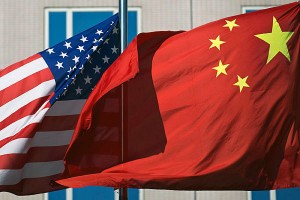Chinese President warns US and China confrontation would be a disaster
Thursday, July 10th, 2014 11:55:05 by Khalil Khan
A confrontation between China and the U.S. would be a disaster for both countries and the world in general, has warned Chinese President Xi Jinping on Wednesday to start the sixth annual round of China-US dialogue. The two-day talks in Beijing, called the Strategic and Economic Dialogue, come at a time of estrangement between the two major world powers, due to accusations of cyber espionage and mutual suspicions about its intentions in the Asia-Pacific. Both issues, including negotiations for a treaty of mutual investments or the yuan, are some of the protagonists in high-level talks.
The U.S. delegation is headed by the Secretaries of State, John Kerry, and the Treasury, Jacob Lew. For China, the Foreign Minister Wang Yi, and the Minister of State, Yang Jiechi lead the talks started today with an opening ceremony at the residence of Diaoyutai State Guest in the west of Beijing, which abounded appeals namely managing differences of opinion.
In his speech at the beginning of the talks, Xi emphasized the need for understanding between the two countries. ” A confrontation between China and the U.S. would indeed be a disaster for both and for the world.” “We have to respect each other, treat each other as equals, respect the sovereignty and territorial integrity of the other and respect the decisions of each on the path of development,” he added.
Xi and his U.S. counterpart Barack Obama agreed last year, during the summit in Sunnylands (California), push the “new model” of relationship between two power, which would prevail respect and mutual benefit to both parties learn accept and overcome areas of disagreement between the two. But since then, and although two presidents have met on two other occasions, in St. Petersburg during the G20 summit in The Hague and in March this year during the Nuclear Security Summit, bilateral tie has suffered serious setbacks.
US viewed with concern Beijing sovereignty claims increasingly sharp in waters South Sea and East China. He also strongly criticized the unilateral establishment of the People’s Republic of Area Air Defense Identification (ADIZ) near the Diaoyu islands known as Senkaku in Japanese and Mandarin, Beijing and Tokyo are disputed. In turn, China accuses U.S. of creating ill will in the region to support the countries with which it has tense territorial disputes: Vietnam and the Philippines, and Japan. Tensions rose further degree in May, after the U.S. cyber espionage charges presented against five Chinese military. The government in Beijing considers that these allegations are “fabricated” and brings up, in turn, claims the security expert Edward Snowden on the activities of U.S. intelligence.
In a statement read at the opening ceremony, U.S. President Barack Obama, said “we are committed to the common goal of developing over time a new model of relations with China defined by increased practical cooperation and constructive management of differences. We must use this dialog to show the world that even in such a complex relationship like ours, we are determined to ensure that such cooperation defines the total relationship.”
Until now, the rounds of dialogue have yielded no significant concrete results. But they have become a useful tool for taking the pulse each other, try to generate mutual trust and avoid misunderstandings that may have serious consequences in the relationship. Both countries emphasize the need to deepen the dialogue on areas of possible understanding, such as combating terrorism and climate change.
The last time Beijing hosted the talks, alternating its venue between China and Washington capital, the dialogue was sidelined by the crisis generated by the Chen Guangcheng blind dissident, who on the eve of the arrival of the then secretary of State, Hillary Clinton, escaped from house arrest to which he was subject at his home in Shandong and escaped with a broken foot, at the U.S. Embassy in Beijing. The crisis ended only after a series of intense negotiations between the two governments that ended with the departure of Chen, a self-taught lawyer, to New York to study at the university.
This time, the prominent Tibetan writer Tsering Woeser has reported that she and her husband, Wang Lixiong, have been under house arrest, apparently after being invited to a dinner at the American Embassy. In his Twitter account, Woeser said that last night, on her return from a trip to Inner Mongolia in the north of the country, security officials came to her home to inform her and her husband that they could not leave the house. When asked why, he replied that it was “confidential”. “But I know that is because I had two days before calling the U.S. Embassy to invite me for dinner. As I was away, they changed the date for the next day. Not know who had dined, but no matter who, Security Services have kept me going, ” she notes.
Last year, the State Department awarded Woeser a prize as International Woman of Courage. The restrictions imposed on the writer prevented her to travel to Washington to receive the award.
Tags: China, Chinese President Xi Jinping, United States of America, US President Barack Obama
Short URL: https://www.newspakistan.pk/?p=46188

















